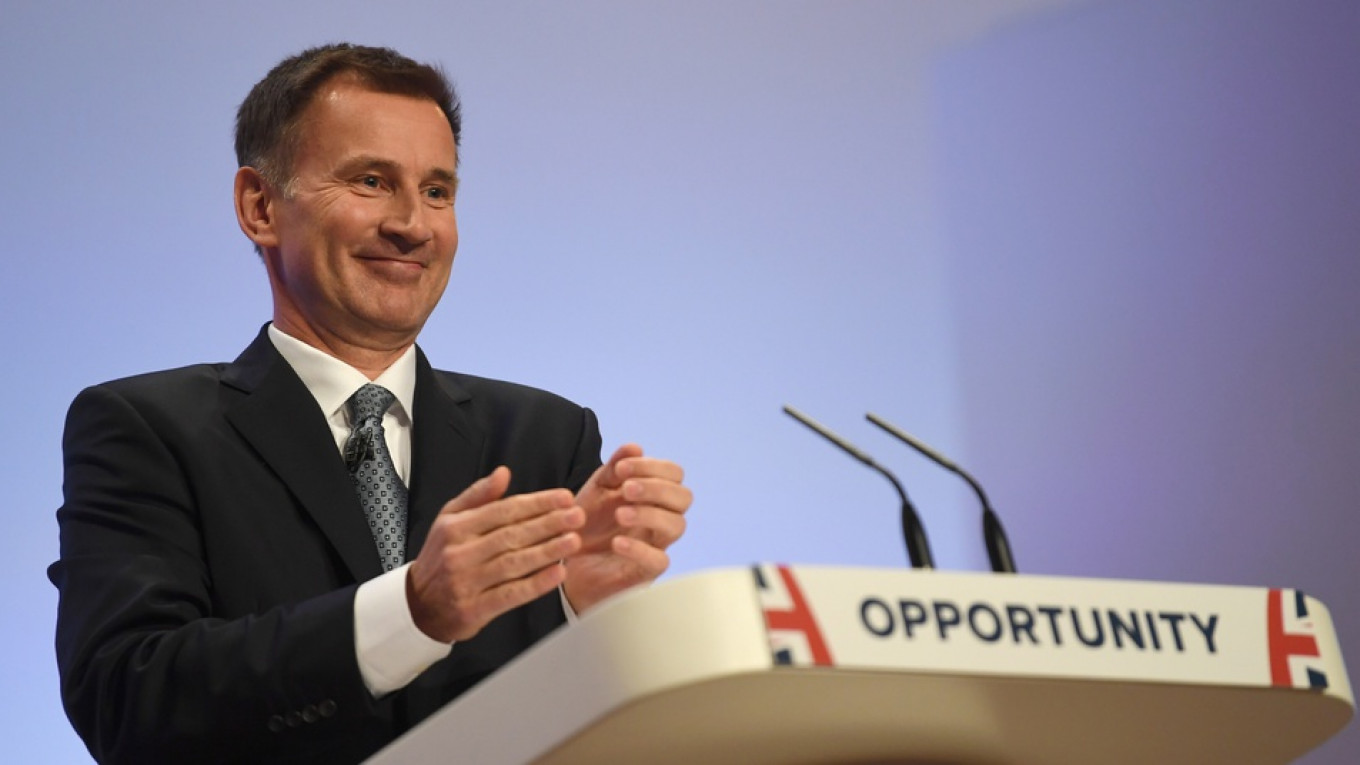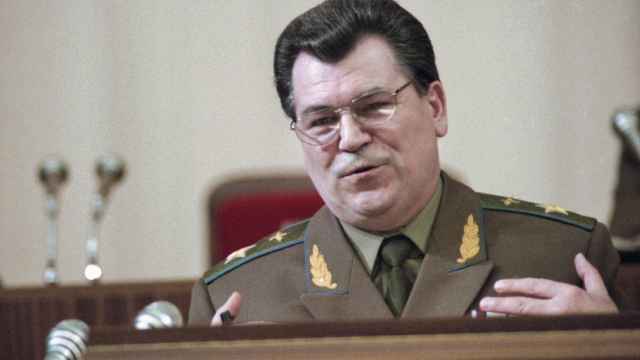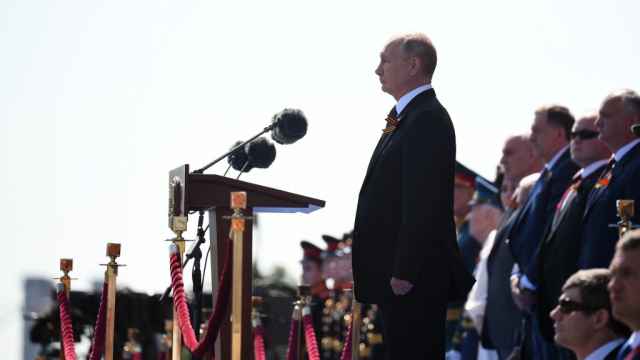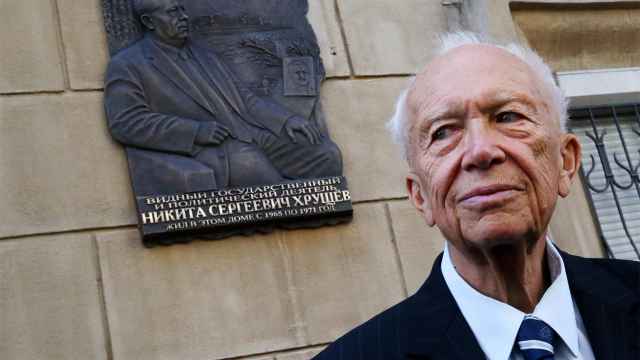Jeremy Hunt, the U.K.’s foreign secretary, likened the European Union to the Soviet Union at a party conference on Sunday, earning him predictable rebukes from the EU and, specifically, from member states that were parts or satellites of the U.S.S.R. His comments deserve a more nuanced discussion, if only because he isn’t the first to draw the parallel.
In accusing EU negotiators of trying to punish the U.K. for Brexit, Hunt said:
"What happened to the confidence and ideals of the European dream? The EU was set up to protect freedom. It was the Soviet Union that stopped people leaving. The lesson from history is clear: if you turn the EU club into a prison, the desire to get out won't diminish, it will grow -- and we won't be the only prisoner that will want to escape."
The angry responses from countries where knowledge of the Soviet Union isn’t a matter of reading history books focused on the glaring flaw in Hunt’s comparison. “Did the Red Army force you to join?” Former Polish Foreign Minister Radoslaw Sikorski tweeted. “How many millions has Brussels exterminated? Gulag for demanding a referendum on independence?” The Latvian ambassador to the U.K., Baiba Braze, also pointed out that the Soviet Union killed and imprisoned people, “while the EU has brought prosperity, equality, growth, respect.”
It’s possible that Hunt’s “lesson from history” doesn’t refer to Josef Stalin’s Soviet Union with its mass executions and imprisonments. Rather, he was talking about the Soviet Union of the late 1980s, when the Communist leadership in Moscow no longer had the power or the stomach to apply indiscriminate violence but still tried hard to stop the Soviet republics from leaving. Even in those years, however, violent episodes, including the botched special forces takeover of the Lithuanian capital Vilnius in January 1991 (15 people died and hundreds were wounded) and the earlier bloody crackdowns on the anti-Soviet opposition in Azerbaijan and Georgia, make Hunt’s analogy imprecise, to say the least.
It’s also possible that Hunt, and European Parliament member Nigel Farage, who tweeted his agreement with the foreign secretary, merely overstated a certain narrow point about the U.S.S.R. The Soviet leadership’s main argument against secession was economic: It tried to show the independence-minded states that their economies would collapse if they severed longstanding ties with Russia and the other Soviet republics. In 1990, the Soviet Union attempted an economic blockade of Lithuania immediately after it declared independence, stopping the supply of fuel and other goods and cutting off sea routes to the Baltic state. After three months, Lithuania suspended its independence declaration -- only to reinstate it at the end of the year.
That appears to reinforce Hunt’s point: Economic pain strengthens rather than undermines a nation’s resolve to assert its sovereignty. Yet this line of reasoning doesn’t quite work, either.
As they seceded, the former Soviet republics weren’t demanding a special relationship with Moscow. Russia was begging them to accept one. Since the Soviet Union collapsed, Russia, not the countries that had gained independence from it, has spearheaded every attempt at economic reintegration, including President Vladimir Putin’s pet project, the Eurasian Economic Union.
In the EU-U.K. situation, the “secessionist” entity is vying for closer economic ties, and so it will remain after Brexit. There are a couple of good reasons for the difference: The Soviet Union was centralized; the blood had to run through the heart, which was Moscow. The EU doesn’t have that kind of structure. It’s all about access to horizontal economic ties, which the Europeans only want to grant under certain conditions. And the U.K. wants that access because the EU, with its great wealth, has far more to offer its members than the Soviet Union could offer its parts and satellites.
None of this means a convincing, and alarming, parallel between the EU and the Soviet Union cannot be drawn. It would, however, involve “the confidence and ideals of the European dream” rather than the EU’s calculating rejection of the U.K.’s naive attempts at economic cherry-picking.
The former dissident Vladimir Bukovsky, expelled from the Soviet Union in 1976, has claimed that the EU, like the U.S.S.R., is an inherently undemocratic ideological entity trying to create a new type of person, not rooted in ethnicity or tradition. Bukovsky also advanced an eye-popping conspiracy theory about Mikhail Gorbachev’s involvement with plans to turn Europe into a socialist federation, for which no corroboration exist. Still, the point about a technocratic elite working to water down national identities is valid to an extent. Whether or not one subscribes to identity politics, the EU is a threat to them and they are a threat to the EU.
Some Putin-friendly Moscow intellectuals share Bukovsky’s view of the EU as an ideological entity. Alexander Lukin, a professor at the Higher School of Economics in Moscow, wrote after the Brexit vote that if the EU or its members moves to empower ordinary citizens through more direct democracy, Europe could suffer the fate of Gorbachev’s Soviet Union because the people don’t share the EU’s underlying ideology.
These ideas and warnings have nothing to do with Hunt’s frustration at not being able to get a better economic deal from the EU but everything to do with the underlying rationale for Brexit -- the sense among some British voters that their identity was threatened by a globalist continental elite. The paradigm shared by Bukovsky and Lukin doesn’t allow for moaning because a special economic deal isn’t on offer; this view requires from Brexiters a determination to push on regardless of the consequences, as the Baltic republics’ leaders once did. They didn’t want Moscow’s respect, understanding or friendship — just their independence.
But then, the EU ultimately was there to help those countries avoid an economic freefall. No one is there for the U.K.
Leonid Bershidsky is a Bloomberg Opinion columnist covering European politics and business. He was the founding editor of the Russian business daily Vedomosti and founded the opinion website Slon.ru. The views expressed in opinion pieces do not necessarily reflect the editorial position of The Moscow Times.
A Message from The Moscow Times:
Dear readers,
We are facing unprecedented challenges. Russia's Prosecutor General's Office has designated The Moscow Times as an "undesirable" organization, criminalizing our work and putting our staff at risk of prosecution. This follows our earlier unjust labeling as a "foreign agent."
These actions are direct attempts to silence independent journalism in Russia. The authorities claim our work "discredits the decisions of the Russian leadership." We see things differently: we strive to provide accurate, unbiased reporting on Russia.
We, the journalists of The Moscow Times, refuse to be silenced. But to continue our work, we need your help.
Your support, no matter how small, makes a world of difference. If you can, please support us monthly starting from just $2. It's quick to set up, and every contribution makes a significant impact.
By supporting The Moscow Times, you're defending open, independent journalism in the face of repression. Thank you for standing with us.
Remind me later.








